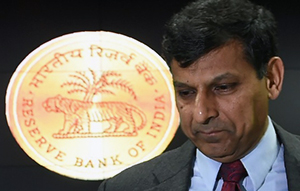New Delhi, Jun 19: Calling RBI Governor Raghuram Rajan's exit a 'bad omen' for the Indian economy, eminent economists and former policymakers today said it will be seen by the world as India's non-approval to a policy against inflation and bad loans.

Rajan's colleague at Chicago University Booth School of Business Luigi Zingales termed it is a "huge loss for India", while Harvard University professor Gita Gopinath said it was "deeply disappointing" that the government instead of fighting hard to keep Rajan has let him go amid all the distasteful comments by those questioning his commitment to India's best interests.
Indian-origin economist and British Labour Party leader Meghnad Desai said he feels "sorry for India's reputation abroad", while World Bank's Chief Economist and India's former Chief Economic Advisor Kaushik Basu said Rajan has been one of the finest central bank governors anywhere.
53-year old Rajan, a former IMF Chief Economist with a reputation to have rightly called the 2008 global financial crisis, yesterday made public his decision against a second term as RBI Governor after his currently three-year tenure ends on September 4, 2016.
Rajan, the on-leave Professor of Finance at Chicago Booth School, said he would return to academia but would be ready to serve India again in future.
Rajan indicated he was willing to take a shot at a second term, saying he was "open to seeing" through his unfinished work on containing inflation and cleaning up the books of bank, but said no to a second term "on due reflection, and after consultation with the government".
This is being seen in some quarters as his unhappiness over the way things have developed in recent months with regard to a barrage of personal attacks on him from some quarters and the government reaction to that.
Echoing the sentiments of various top industry leaders from India, who termed Rajan's exit as 'nation's loss', the economists from abroad and the former policymakers back home said it can prove to be "very costly" for Indian economy.
Gopinath told PTI history will judge Rajan as one of the most effective central bankers of not just India but of the world".
"This is a very sad day for the Indian economy and it is deeply disappointing that the government instead of fighting hard to keep Rajan has let him go amidst all the distasteful comments including those that question his performance and his commitment to India's best interest," Gopinath, John Zwaanstra Professor of International Studies and of Economics, told PTI.
Desai said it is a pity that Rajan decided to go and the task of his successor, whoever he or she is, will be very difficult.
"I am not surprised but sorry for India's reputation abroad. He was criticised for doing what a central banker has to do. It will be seen by the world at large that an anti- inflation policy, a policy of cleaning up non-performing assets of banks and being tough on banks' balance sheets are not policies which meet with approval in India," Desai told PTI.
Former Finance Secretary Arvind Mayaram also expressed his disappointment and said Raghuram Rajan's decision not to seek a second term would be very costly for the economy.
"Raghuram Rajan's decision not to seek second term would be very costly for the economy. Not a good omen," Mayaram tweeted.
Zingales, who recently wrote that Rajan was being attacked for fighting the inefficiencies of the banking system and taking on the crony capitalists in the country, tweeted, "Rajan leaves RBI to come back to Booth. A great gain for us, a huge loss for India".
Zingales, who has also been Rajan's co-author, recently wrote in an article that the governorship in India earlier used to be "entrusted to grey bureaucrats that left no impact".
"Rajan, however, is the dream of the new India: young, competent, and reached the top of the Indian central bank because of his skill, not because of his political alignment," he had said.
Nobel laureate Amartya Sen had said yesterday that India was losing one of the most skillful economic thinkers in the world.
"We are losing one of the most skillful financial economic thinkers in the world. It is sad for the country and it is sad for the government of the country too. RBI is not a completely autonomous institution," he said in a TV interview.
Noting that he is not a great admirer of the Modi government, the economist said the administration may have to decide what it wants in its policy.






Comments
Add new comment